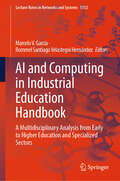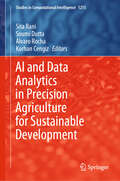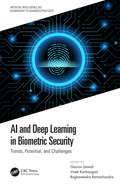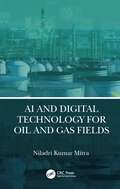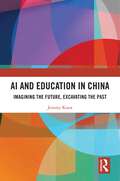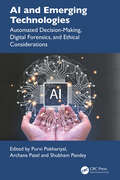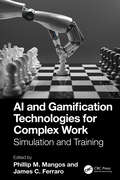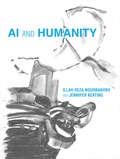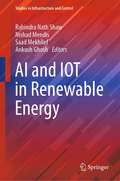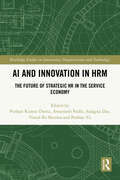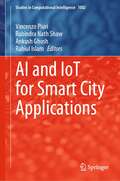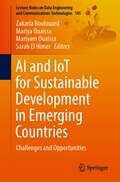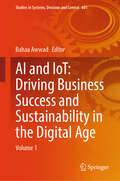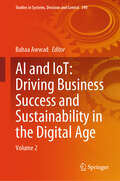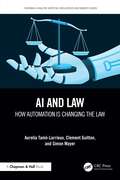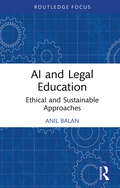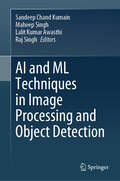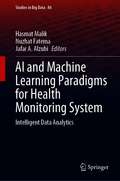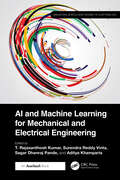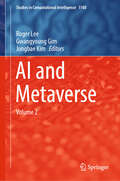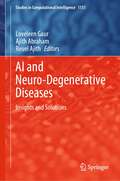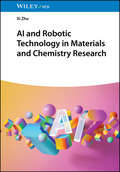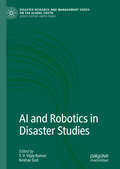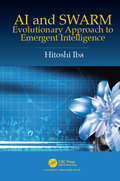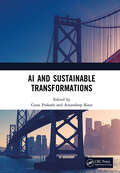- Table View
- List View
AI and Computing in Industrial Education Handbook: A Multidisciplinary Analysis from Early to Higher Education and Specialized Sectors (Lecture Notes in Networks and Systems #1512)
by Marcelo V. Garcia Rommel Santiago Velastegui HernándezThis book bridges Industry 4.0 principles with educational innovation, offering groundbreaking approaches that transform learning environments across diverse contexts. Readers discover practical applications ranging from AI-powered diagnostics to gamification strategies, all designed to make education more accessible, engaging, and effective.The unique collaboration between Hispanic American and European researchers brings fresh perspectives to educational technology, organizing cutting-edge research into six comprehensive sections. What distinguishes this work is its human-centered approach—each technological advancement connects directly to pedagogical improvement.Educators, researchers, and technology specialists find value in the book&’s exploration of solutions like holographic displays, 3D-printed prosthetics for STEM education, and psychological self-assessment platforms. Beyond serving as a reference, this book establishes a foundation for continued cross-cultural dialogue and future innovation, helping institutions integrate emerging technologies while keeping human development at the core of educational transformation.
AI and Data Analytics in Precision Agriculture for Sustainable Development (Studies in Computational Intelligence #1215)
by Álvaro Rocha Soumi Dutta Korhan Cengiz Sita RaniThis book offers a comprehensive analysis of artificial intelligence (AI) and data analytics in precision agriculture. The integration of technology in agriculture is revolutionizing traditional farming practices, paving the way for sustainability. Precision farming, powered by AI, IoT, and big data, optimizes resource use by enabling real-time monitoring of soil health, weather conditions, and crop growth. Automated irrigation systems and drones reduce water wastage and enhance productivity. Biotechnology advances, such as genetically modified crops and CRISPR gene editing, improve yield, pest resistance, and climate adaptability. Vertical farming and hydroponics offer space-efficient solutions, minimizing land degradation and water consumption. Robotics and autonomous machinery streamline labor-intensive tasks, reducing reliance on chemical inputs. Blockchain ensures transparency in the food supply chain, promoting fair trade and reducing food fraud. Renewable energy sources, like solar-powered farms, further lower agriculture&’s carbon footprint. By adopting these innovations, farmers can produce more with fewer resources, ensuring food security while preserving the environment. Embracing technology-driven agriculture is crucial for meeting global food demands sustainably, combating climate change, and fostering economic resilience in farming communities. The future of agriculture lies in intelligent, data-driven, and eco-friendly solutions that balance productivity with environmental stewardship.
AI and Deep Learning in Biometric Security: Trends, Potential, and Challenges (Artificial Intelligence (AI): Elementary to Advanced Practices)
by Gaurav Jaswal Vivek KanhangadThis book provides an in-depth overview of artificial intelligence and deep learning approaches with case studies to solve problems associated with biometric security such as authentication, indexing, template protection, spoofing attack detection, ROI detection, gender classification etc. This text highlights a showcase of cutting-edge research on the use of convolution neural networks, autoencoders, recurrent convolutional neural networks in face, hand, iris, gait, fingerprint, vein, and medical biometric traits. It also provides a step-by-step guide to understanding deep learning concepts for biometrics authentication approaches and presents an analysis of biometric images under various environmental conditions. This book is sure to catch the attention of scholars, researchers, practitioners, and technology aspirants who are willing to research in the field of AI and biometric security.
AI and Digital Technology for Oil and Gas Fields
by Niladri Kumar MitraThe book essentially covers the growing role of AI in the oil and gas industry, including digital technologies used in the exploration phase, customer sales service, and cloud-based digital storage of reservoir simulation data for modeling. It starts with the description of AI systems and their roles within the oil and gas industry, including the agent-based system, the impact of industrial IoT on business models, and the ethics of robotics in AI implementation. It discusses incorporating AI into operations, leading to the reduction of operating costs by localizing control functions, remote monitoring, and supervision.Features of this book are given as follows: It is an exclusive title on the application of AI and digital technology in the oil and gas industry It explains cloud data management in reservoir simulation It discusses intelligent oil and gas well completion in detail It covers marketing aspects of oil and gas business during the exploration phase It reviews development of digital systems for business purposes This book is aimed at professionals in petroleum and chemical engineering, technology, and engineering management.
AI and Education in China: Imagining the Future, Excavating the Past
by Jeremy KnoxThis book explores the relationships between artificial intelligence (AI) and education in China. It examines educational activity in the context of profound technological interventions, far-reaching national policy, and multifaceted cultural settings. By standing at the intersection of three foundational topics – AI and the recent proliferation of data-driven technologies; education, the most foundational of our social institutions in terms of actively shaping societies and individuals; and, finally, China, which is a frequent subject for dramatic media reports about both technology and education – this book offers an insightful view of the contexts that underpin the use of AI in education, and promotes a more in-depth understanding of China. Scholars of educational technology and digital education will find this book an indispensable guide to the ways new technologies are imagined to transform the future, while being firmly grounded in the past.
AI and Emerging Technologies: Automated Decision-Making, Digital Forensics, and Ethical Considerations
by Archana Patel Purvi Pokhariyal Shubham PandeyIn the past decade, Artificial Intelligence (AI) has made significant advancements in various sectors of society, such as education, health, e-commerce, media and entertainment, banking and finance, transportation, and defense, among others. Its application has permeated every sector, leaving no area untouched. However, the utilization of AI brings forth crucial legal, ethical, and technical concerns and obstacles that must be appropriately addressed through thoughtful deliberation, discussions, and the implementation of effective regulations.AI and Emerging Technologies: Automated Decision-Making, Digital Forensics, and Ethical Considerations provides a comprehensive and insightful roadmap for exploring the advancements, challenges, solutions, and implications of AI in three key areas: the legal field, gaming applications, digital forensic, and decision-making. By delving into these topics, this book offers a deep understanding of how AI can be optimally utilized to deliver maximum benefits to users, all within a single, comprehensive source. One of the focuses of this book is to shed light on the preictal application of emerging technologies in automated decision-making while also addressing the ethical considerations that arise from their use. By examining the integration of these technologies into digital forensics and their impact on other domains, such as gaming applications deep fake, this book presents valuable insights into the broader implications of AI.The book serves as an invaluable resource for anyone seeking to understand and navigate the complex world of AI. By offering a comprehensive exploration of its applications, ethical considerations, and data protection techniques, it provides researchers and scholars, graduate students, software engineers along with data scientists the necessary insights to harness the full potential of AI while ensuring its responsible and ethical use.
AI and Gamification Technologies for Complex Work
by James C. FerraroThe medium through which training in the workplace is delivered has been changing in recent years to offer a more personalized and immersive experience. The invention of virtual reality (VR) and augmented reality (AR) platforms has created opportunities to take a more hands-on approach to familiarizing oneself with a task or environment with mitigated time and monetary commitments. Written assessments are being swiftly replaced with more interactive and scientifically validated training simulations and this essential technology is in high demand in the government and private sectors. This book highlights many of the ways simulation-based training can be leveraged to create personalized training curricula for those in high-risk careers and how it can be assessed successfully. AI and Gamification Technologies for Complex Work uncovers the use of artificial intelligence (AI) and machine learning (ML) for the purposes of creating adaptive, personalized training for individuals who work in complex jobs. It covers adaptive simulation-based training, fighting skill decay through game-based training, and additional uses of AI/ML and other tools in measuring human performance. Insights from professionals and experts in the fields of simulation and training provide readers with information about current applications of AI/ML in creating adaptive or personalized training, as well as investigations into the future of simulation and game-based training, as virtual and augmented realities proliferate modern training programs. The book looks at how data science, AI, and ML contribute to adaptive training systems and the reader is encouraged to look further into the engines that drive adaptive training while devising their own systems for training in complex jobs. This book is ideal for professionals in human factors engineering and psychology, artificial intelligence, military training and simulation, game development, data science, modeling and simulation and industrial and organizational psychology.
AI and Humanity (The\mit Press Ser.)
by Illah Reza Nourbakhsh Jennifer KeatingAn examination of the implications for society of rapidly advancing artificial intelligence systems, combining a humanities perspective with technical analysis; includes exercises and discussion questions.AI and Humanity provides an analytical framing and a common language for understanding the effects of technological advances in artificial intelligence on society. Coauthored by a computer scientist and a scholar of literature and cultural studies, it is unique in combining a humanities perspective with technical analysis, using the tools of literary explication to examine the societal impact of AI systems. It explores the historical development of these technologies, moving from the apparently benign Roomba to the considerably more sinister semi-autonomous weapon system Harpy. The book is driven by an exploration of the cultural and etymological roots of a series of keywords relevant to both AI and society. Works examined range from Narrative of the Life of Frederick Douglass, given a close reading for its themes of literacy and agency, to Simon Head's critique of the effects of surveillance and automation on the Amazon labor force in Mindless.Originally developed as a textbook for an interdisciplinary humanities-science course at Carnegie Mellon, AI & Humanity offers discussion questions, exercises (including journal writing and concept mapping), and reading lists. A companion website provides updated resources and a portal to a video archive of interviews with AI scientists, sociologists, literary theorists, and others.
AI and IOT in Renewable Energy (Studies in Infrastructure and Control)
by Saad Mekhilef Ankush Ghosh Rabindra Nath Shaw Nishad MendisThis book presents the latest research on applications of artificial intelligence and the Internet of Things in renewable energy systems. Advanced renewable energy systems must necessarily involve the latest technology like artificial intelligence and Internet of Things to develop low cost, smart and efficient solutions. Intelligence allows the system to optimize the power, thereby making it a power efficient system; whereas, Internet of Things makes the system independent of wire and flexibility in operation. As a result, intelligent and IOT paradigms are finding increasing applications in the study of renewable energy systems. This book presents advanced applications of artificial intelligence and the internet of things in renewable energy systems development. It covers such topics as solar energy systems, electric vehicles etc. In all these areas applications of artificial intelligence methods such as artificial neural networks, genetic algorithms, fuzzy logic and a combination of the above, called hybrid systems, are included. The book is intended for a wide audience ranging from the undergraduate level up to the research academic and industrial communities engaged in the study and performance prediction of renewable energy systems.
AI and Innovation in HRM: The Future of Strategic HR in the Service Economy (Routledge Studies in Innovation, Organizations and Technology)
by Pushan Kumar Dutta Amarnath Padhi Sulagna Das Vinod Kr Sharma Poshan YuThis book provides a comprehensive blueprint for organizations to strategically leverage AI technologies and drive innovation in their HRM practices, enabling them to cultivate a future-ready workforce that can thrive in the service-centric marketplace. It weighs in on the challenges and opportunities brought forth by the convergence of AI and HRM in a rapidly evolving service economy.Drawing insights from management theory, organizational psychology, and technology studies, this multidisciplinary book explores how AI can augment and elevate various facets of strategic HRM, from talent acquisition and employee development to performance management and organizational culture enhancement. It offers a future-focused perspective on HRM's evolving role in shaping the workplace of tomorrow, emphasizing the pivotal role of AI in fostering organizational agility, innovation, and competitiveness. The international contributors delve into the unique challenges and opportunities presented by AI integration in service industry contexts, providing tailored strategies and best practices for effective adoption, as well as addressing ethical considerations and responsible governance of AI systems.This timely volume will be a valuable resource for scholars across human resource management, organizational management, and innovation and technology management. It will be useful to HR professionals, business leaders, and decision-makers in service-based organizations.
AI and IoT for Smart City Applications (Studies in Computational Intelligence #1002)
by Vincenzo Piuri Rabiul Islam Ankush Ghosh Rabindra Nath ShawThis book provides a valuable combination of relevant research works on developing smart city ecosystem from the artificial intelligence (AI) and Internet of things (IoT) perspective. The technical research works presented here are focused on a number of aspects of smart cities: smart mobility, smart living, smart environment, smart citizens, smart government, and smart waste management systems as well as related technologies and concepts. This edited book offers critical insight to the key underlying research themes within smart cities, highlighting the limitations of current developments and potential future directions.
AI and IoT for Sustainable Development in Emerging Countries: Challenges and Opportunities (Lecture Notes on Data Engineering and Communications Technologies #105)
by Mariya Ouaissa Zakaria Boulouard Mariyam Ouaissa Sarah El HimerThis book comprises a number of state-of-the-art contributions from both scientists and practitioners working in a large pool of fields where AI and IoT can open up new horizons. Artificial intelligence and Internet of Things have introduced themselves today as must-have technologies in almost every sector. Ranging from agriculture to industry and health care, the scope of applications of AI and IoT is as wide as the horizon. Nowadays, these technologies are extensively used in developed countries, but they are still at an early stage in emerging countries. AI and IoT for Sustainable Development in Emerging Countries—Challenges and Opportunities is an invaluable source to dive into the latest applications of AI and IoT and how they have been used by researchers from emerging countries to solve sustainable development-related issues by taking into consideration the specifities of their countries. This book starts by presenting how AI and IoT can tackle the challenges of sustainable development in general and then focuses on the following axes: · AI and IoT for smart environment and energy · Industry 4.0 and intelligent transportation · A vision towards an artificial intelligence of medical things · AI, social media, and big data analytics. It aspires to provide a relevant reference for students, researchers, engineers, and professionals working in these particular areas or those interested in grasping its diverse facets and exploring the latest advances on their respective fields and the role of AI and IoT in them.
AI and IoT: Volume 1 (Studies in Systems, Decision and Control #601)
by Bahaa AwwadThis book explores the integration of AI technologies with emerging trends such as IoT, blockchain, and cloud computing. In this book readers will embark on a transformative journey that explores the powerful convergence of Artificial Intelligence (AI), Internet of Things (IoT), and business management. With the advent of these cutting-edge technologies, businesses have unprecedented opportunities to revolutionize their operations, drive innovation, and achieve remarkable success in today's digital landscape.
AI and IoT: Volume 2 (Studies in Systems, Decision and Control #590)
by Bahaa AwwadThis book embarks on a transformative journey that explores the powerful convergence of artificial intelligence (AI), Internet of Things (IoT), and business management. With the advent of these cutting-edge technologies, businesses have unprecedented opportunities to revolutionize their operations, drive innovation, and achieve remarkable success in today's digital landscape.
AI and Law: How Automation is Changing the Law (Chapman & Hall/CRC Artificial Intelligence and Robotics Series)
by Aurelia Tamo-Larrieux Clement Guitton Simon MayerThis book provides insights into how AI is changing legal practice, government processes, and individuals’ access to those processes, encouraging each of us to consider how technological advances are changing the legal system. Particularly, and distinct from current debates on how to regulate AI, this books focuses on how the progressive merger between computational methods and legal rules changes the very structure and application of the law itself.We investigate how automation is changing the legal analysis, legal rulemaking, legal rule extraction, and application of legal rules and how this impacts individuals, policymakers, civil servants, and society at large. We show through many examples that a debate on how automation is changing the law is needed, which must revolve around the democratic legitimacy of the automation of legal processes, and be informed by the technical feasibility and tradeoffs of specific endeavors.
AI and Legal Education: Ethical and Sustainable Approaches (Routledge Research in the Law of Emerging Technologies)
by Anil BalanThis book provides a comprehensive interdisciplinary analysis of the sustainable and ethical integration of artificial intelligence (AI) within legal education, offering practical strategies for balancing innovation with ethical responsibility. Discussing the intersection of legal studies, technology and ethics, the book focuses on AI's role in reshaping professional education.With the rising demand for digital transformation in legal education and the increasing scrutiny of AI's ethical impact, this book explores the potential of AI to enhance legal learning and practice, while critically examining the challenges of data privacy, algorithmic bias and equitable access to technology. Outlining a framework for incorporating AI into the law curriculum, the book equips the readers with both cutting-edge technological skills and a deep understanding of AI’s ethical and societal implications. Drawing on a wide range of sources, including industry data and academic research, the book offers grounded, actionable guidance on implementing AI in a way that promotes inclusivity, sustainability and long-term relevance. It addresses the needs of legal education institutions, faculty and students, providing them with the tools to navigate the evolving legal landscape while maintaining ethical standards.The book will also be of interest to researchers in the fields of law, education and AI ethics.
AI and ML Techniques in Image Processing and Object Detection
by Lalit Kumar Awasthi Maheep Singh Raj Singh Sandeep Chand KumainThis book highlights the evolution and interdisciplinary approach of AI and ML in image processing, tracing historical development and exploring their convergence with different fields. It delves into optimizing neural architectures and making deep learning models interpretable while exploring recent trends like versatile CNN applications and edge computing deployment. The intersection of AI and creativity, dynamic transfer learning, and domain adaptation are discussed alongside object detection techniques and reinforcement learning. It examines advanced applications in satellite imagery, healthcare, and smart cities, addressing ethical considerations like bias mitigation and transparency. This book also outlines future trends such as quantum-inspired computing and the evolution of edge AI ecosystems.
AI and Machine Learning Paradigms for Health Monitoring System: Intelligent Data Analytics (Studies in Big Data #86)
by Jafar A. Alzubi Hasmat Malik Nuzhat FatemaThis book embodies principles and applications of advanced soft computing approaches in engineering, healthcare and allied domains directed toward the researchers aspiring to learn and apply intelligent data analytics techniques. The first part covers AI, machine learning and data analytics tools and techniques and their applications to the class of several hospital and health real-life problems. In the later part, the applications of AI, ML and data analytics shall be covered over the wide variety of applications in hospital, health, engineering and/or applied sciences such as the clinical services, medical image analysis, management support, quality analysis, bioinformatics, device analysis and operations. The book presents knowledge of experts in the form of chapters with the objective to introduce the theme of intelligent data analytics and discusses associated theoretical applications. At last, it presents simulation codes for the problems included in the book for better understanding for beginners.
AI and Machine Learning for Mechanical and Electrical Engineering (Innovations in Intelligent Internet of Everything (IoE))
by Aditya Khamparia Sagar Dhanraj Pande T. Rajasanthosh Kumar Surendra Reddy VintaPractical and informative, AI and Machine Learning for Mechanical and Electrical Engineering examines how artificial intelligence (AI) is changing the status quo in mechanical engineering, electrical systems, and management. Real-world examples and case studies demonstrate the application of AI in such diverse settings as industry and policymaking. This book illustrates how AI is playing a crucial role in enhancing productivity and innovation in various industries. It discusses transition methods and the ethical implications of using AI in mechanical engineering. Chapter highlights include the following: Developing a smart algorithm to integrate fault detection and classification Algorithms to investigate different testing scenarios for various anomalies in electric motors Data fusion to detect and assess electromechanical damage Neural networks for rolling bearing fault diagnosis Evolutionary algorithms to optimize deep learning models for water industry forecasts AI-based anomaly detection and root-cause analysis An overarching theme is the transition from traditional mechanical, electrical, and management systems to AI-enabled smart systems. The book helps readers make sense of the challenges of integrating smart systems. It equips engineers with theoretical understanding as well as insight based on hands-on expertise. It shows how to better link and automate systems and improve productivity. This book not only shows how to implement smart solutions now but also shows the way to a more intelligent, productive, and interconnected future.
AI and Metaverse: Volume 2 (Studies in Computational Intelligence #1160)
by Roger Lee Jongbae Kim Gwangyoung GimThe book reports the state-of-the-art results in Artificial Intelligence and Metaverse in both printed and electronic form. Studies in Computation Intelligence (SCI) has grown into the most comprehensive computational intelligence research forum available in the world. This book publishes original papers on both theory and practice that address foundations, state-of-the-art problems and solutions, and crucial challenges.
AI and Neuro-Degenerative Diseases: Insights and Solutions (Studies in Computational Intelligence #1131)
by Ajith Abraham Loveleen Gaur Reuel AjithThis book explores the current state of healthcare practice and provides a roadmap for harnessing artificial intelligence (AI) and other modern cognitive technologies for neurogenerative diseases. The main goal of this book is to look at how these techniques can be used to classify patients with neurodegenerative diseases by extracting data from multiple modalities. It demonstrates that the growing development of computer-aided diagnosis systems has a lot of potential to help with the diagnostic process. It offers an analysis of the prospective and perils in implementing such state of the art.Progressive brain disorders with a high prevalence in the general population include Parkinson's disease, Alzheimer's disease and other types of dementia, Huntington's disease, and motor neuron disease. Worldwide, it is estimated that 33 million people have Alzheimer's disease, and 10 million people have Parkinson's disease. The global health economy is significantly impacted by these disorders, which affect both the patient and the caregivers. Various diagnostic techniques are used for differential diagnoses, such as brain imaging, EEG analysis, molecular analysis, and cognitive, psychological, and physical examination. The book aims to develop effective treatments, enhance patient quality of life, and extend life expectancy. It focuses on novel artificial intelligence approaches to clarify the pathogenesis of neurodegenerative disorders and provide early diagnosis.The authors compile recent developments based on machine learning and deep learning techniques to diagnose neurodegenerative diseases using imaging, genetic, and clinical data. The authors support initiatives and methods that aim to improve the application of algorithms in diagnostic practice.
AI and Robotic Technology in Materials and Chemistry Research
by Xi ZhuA singular resource for researchers seeking to apply artificial intelligence and robotics to materials science In AI and Robotic Technology in Materials and Chemistry Research, distinguished researcher Dr. Xi Zhu delivers an incisive and practical guide to the use of artificial intelligence and robotics in materials science and chemistry. Dr. Zhu explains the principles of AI from the perspective of a scientific researcher, including the challenges of applying the technology to chemical and biomaterials design. He offers concise interviews and surveys of highly regarded industry professionals and highlights the interdisciplinary and broad applicability of widely available AI tools like ChatGPT. The book covers computational methods and approaches from algorithms, models, and experimental data systems, and includes case studies that showcase the real-world applications of artificial intelligence and lab automation in a variety of scientific research settings from around the world. You'll also find: A thorough introduction to the challenges currently being faced by chemists and materials science researchers Comprehensive explorations of autonomous laboratories powered by artificial intelligence and robotics Practical discussions of a blockchain-powered anti-counterfeiting experimental data system in an autonomous laboratory In-depth treatments of large language models as applied to autonomous materials research Perfect for materials scientists, analytical chemists, and robotics engineers, AI and Robotic Technology in Materials and Chemistry Research will also benefit analytical and pharmaceutical chemists, computer analysts, and other professionals and researchers with an interest in artificial intelligence and robotics.
AI and Robotics in Disaster Studies (Disaster Research and Management Series on the Global South)
by T. V. Vijay Kumar Keshav SudThis book promotes a meaningful and appropriate dialogue and cross-disciplinary partnerships on Artificial Intelligence (AI) in governance and disaster management. The frequency and the cost of losses and damages due to disasters are rising every year. From wildfires to tsunamis, drought to hurricanes, floods to landslides combined with chemical, nuclear and biological disasters of epidemic proportions has increased human vulnerability and ecosystem sustainability. Life is not as it used to be and governance to manage disasters cannot be a business as usual. The quantum and proportion of responsibilities with the emergency services has increased many times to strain them beyond their human capacities. Its time that the struggling disaster management services get supported and facilitated by new technology of combining Artificial Intelligence (AI) and Machine Learning (ML) with Data Analytics Technologies (DAT)to serve people and government in disaster management. AI and ML have advanced to a state where they could be utilized for many operations in disaster risk reduction. Even though many disasters cannot be prevented and a number of them are blind natural disasters yet through an appropriate application of AI and ML quick predictions, vulnerability identification and classification of relief and rescue operations could be achieved.
AI and SWARM: Evolutionary Approach to Emergent Intelligence
by Hitoshi IbaThis book provides theoretical and practical knowledge on AI and swarm intelligence. It provides a methodology for EA (evolutionary algorithm)-based approach for complex adaptive systems with the integration of several meta-heuristics, e.g., ACO (Ant Colony Optimization), ABC (Artificial Bee Colony), and PSO (Particle Swarm Optimization), etc. These developments contribute towards better problem-solving methodologies in AI. The book also covers emerging uses of swarm intelligence in applications such as complex adaptive systems, reaction-diffusion computing, and diffusion-limited aggregation, etc. Another emphasis is its real-world applications. We give empirical examples from real-world problems and show that the proposed approaches are successful when addressing tasks from such areas as swarm robotics, silicon traffics, image understanding, Vornoi diagrams, queuing theory, and slime intelligence, etc. Each chapter begins with the background of the problem followed by the current state-of-the-art techniques of the field, and ends with a detailed discussion. In addition, the simulators, based on optimizers such as PSO and ABC complex adaptive system simulation, are described in detail. These simulators, as well as some source codes, are available online on the author’s website for the benefit of readers interested in getting some hands-on experience of the subject. The concepts presented in this book aim to promote and facilitate the effective research in swarm intelligence approaches in both theory and practice. This book would also be of value to other readers because it covers interdisciplinary research topics that encompass problem-solving tasks in AI, complex adaptive systems, and meta-heuristics.
AI and Sustainable Transformations
by Gyan Prakash Amandeep KaurAI and Sustainable Transformations presents cutting-edge research and insights into the role of Artificial Intelligence (AI) and emerging technologies in driving human-centered innovation and sustainable transformation across various industries.With an emphasis on aligning technological advancements with sustainable practices, this book explores applications of AI in manufacturing, healthcare and the food industry, it delves into critical themes such as Internet of Things-enabled smart manufacturing, blockchain for secure industrial ecosystems, emerging technologies for sustainable futures, intelligent healthcare systems, AI for sustainable and healthcare supply chains, and applications of AI in the food industry. Through in-depth case studies, technical analyses and alternative solutions, readers will gain a broad-based perspective on AI-driven human-centric development.This is an essential resource for academics, researchers, professionals and policy makers who wish to leverage innovative strategies for a better tomorrow.
